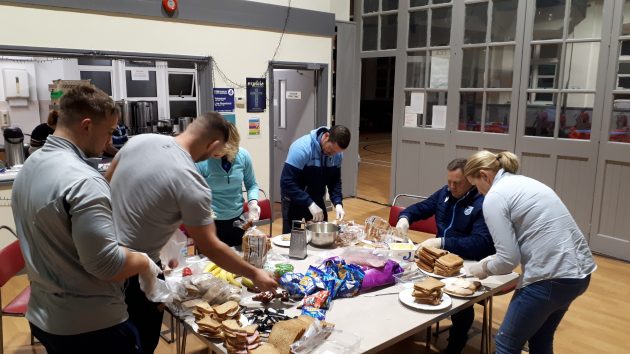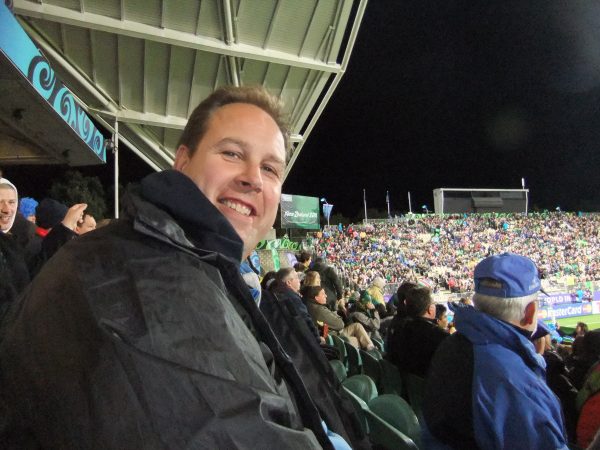Former second-row Martin Lewis has been chaplain at Cardiff Blues for more than a decade. He tells RW about his work behind the scenes at the Guinness Pro14 club
What it’s like to be a rugby chaplain
It’s tempting to say that you wouldn’t notice a rugby club chaplain as he or she goes about their business quietly and unobtrusively, offering words of support to any in need of comfort. But it’s difficult to miss the 6ft 7in former second-row that is Martin Lewis, chaplain at Cardiff Blues. He is an imposing figure in many ways.
Lewis, 57, played 400 first-class rugby games over 12 years – for Penarth, Bridgend and Abertillery – before a snapped ACL ended his playing career at the age of 42.

Playing days: the 1984-85 Penarth team, with second-row Lewis easy to spot in the middle of the back row
He had a Christian faith from a young age, so when he was asked if he’d like to replace Ian Rees as the Blues’ chaplain he accepted the challenge with alacrity. He recently passed ten years in the voluntary role.
What started as strolling up the touchline at academy games, talking to parents or injured players, evolved into ‘Chat with the chaplain’, where young players could take 20 minutes out of training to get problems off their chest. Then Lewis’s role escalated further, embracing the club’s senior players too.
“I started alongside people like Dillon Lewis, Jarrod Evans, Liam Belcher, who are now all first-team regulars,” says Lewis, who retired from a banking career five years ago.
“I’d wander into the gym and Sam Warburton would come out of the corner, ‘Good to see you, Mart’, just be available to people if they wanted a chat. Or some would say ‘Can we meet for a coffee?’ and you would meet them away from the training facility.

Leading Blue: Jarrod Evans is among those Lewis has known for a number of years (Athena Pictures/Getty)
“What we offer is that non-judgemental, impartial listening ear, totally confidential, unless of course there are safeguarding issues. We’ve got this tagline, ‘Pastorally proactive, spiritually reactive’. We’re not there to Bible bash but try to be the hands and feet of Jesus.”
Lewis is a member of Sports Chaplaincy UK, a charity with 600 chaplains across the UK, of which 55 work in rugby union. Invariably it’s a voluntary role and a labour of love. In Wales there have been two or three chaplains at every pro region – Lewis’s wife works with Blues’ mixed ability team, Cardiff Chiefs. More than half the English Premiership clubs have one too.
DID YOU KNOW? Sports Chaplaincy UK (formerly SCORE) was founded in 1991 by John Boyers, who was chaplain at Watford FC and later Man Utd. It provides spiritual and pastoral care to every level of sport, free of charge. For more info, see sportschaplaincy.org.uk
“We provide chaplaincy support at pro level down to grass roots. We’re growing all the time in terms of rugby across Wales. We had a club that held off, understood chaplaincy but weren’t sure. They had a suicide the other week and said please come. Suicide seems to be a real problem in South Wales, particularly across our rugby clubs, which is really concerning.

Here to help: with a booklet from Sports Chaplaincy UK
“The other day I bumped into Gerald Davies, now chairman of the Pro14. He said I’ve heard about you at a meeting, it’s fantastic, we need to have more of you. Trying to get that endorsement from the WRU is a big step for us.”
It’s not just a sympathetic ear that Lewis provides. He might hold a remembrance service, perhaps scatter a fan’s ashes on the pitch.
He took the service for former Bridgend team-mate Gareth Williams, the ex-Wales and Lions back-row, who he visited every few weeks during his dreadful MSA illness. And he’s involved in community work too, with Blues players helping to feed homeless people in Cardiff at his behest.

Feeding the homeless: ex-Blues coach John Mulvihill and others from the club prepare food (Cardiff Blues)
The issues that players face are many and complex. They can surround identity – being seen only as a rugby player instead of as a person. The uncertainty of selection or the public ‘shame’ of being dropped. Injury is a dark tunnel that affects nearly every player at some point. Bereavements, divorce and family health also crop up regularly.
“There was one lad who was very worried his mum had cancer. He jumped to that ‘she’s going to die’ and that became a real mindset challenge.”
Addiction is another topic that Lewis is used to discussing all too frequently. “Online gambling is one of the biggest issues. It’s reckoned that gambling on your phone gives the same sort of buzz as when you’re playing. You can help that person, and the coach doesn’t need to know because playing on the Saturday may well be their outlet.
“But you’ve got to look at what wider damage is going on. It could be that their marriage is at risk because their partner doesn’t know. Then it’s a slippery slide, what about the house?
“Because a lot of gambling, if they’re coming to talk about it, isn’t just an occasional flutter, often there’s big debt behind it. From my banking days I’ve had enough people in my office in tears because somebody’s about to sell the house or their marriage has fallen apart and they just don’t know what to do.

Charity work: Blues U16s load a lorry with boxes destined for a poverty-hit nation (Blues)
“We’re not saying we’ve got every answer but we can help signpost people to specialists. And what we promise is that we’ll keep walking with that person. We’re not going to leave them.”
Overseas players – South Africans, Maoris, Pacific Islanders – are generally far keener on having faith support. Lewis recounts with satisfaction his experiences with the Namibia team at the 2011 World Cup in New Zealand, when each of the 20 finalists was allocated a chaplain. He was there with the charity Engage.
“I had a wonderful time with the Namibians. They are an incredibly spiritual nation, a lot of the guys were saying to me, ‘Mart, can you take me to church? Can we have a Bible study, can we have a prayer time?’ That for me was the whole package of chaplaincy because it was both strands. I went everywhere with them, I’m half Namibian now!”

Converted: he loved his time with Namibia at RWC 2011, where all 20 teams were allocated a chaplain
Subsequent RWC hosts, England and Japan, chose not to offer that level of chaplaincy support but Lewis hopes France will recognise the benefits and put something in place for 2023.
“Sport, and rugby, can learn from having people come in from outside and seeing life in a different way. That’s the value of what we bring. We come with a slightly different skill-set and view of the world into that insular bubble, so we see things that others don’t always spot.
“I’ve had the odd coach say to me, ‘Well, we’ve let that lad down, haven’t we? I don’t know how we’ve missed that’. To think that we’ve kept people from suicide or what have you. If you only did that once in your life, that’s a huge thing, isn’t it?”
This article was originally published in the February 2021 issue of Rugby World.
Can’t get to the shops? You can download the digital edition of Rugby World straight to your tablet or subscribe to the print edition to get the magazine delivered to your door.
Follow Rugby World on Facebook, Instagram and Twitter.





